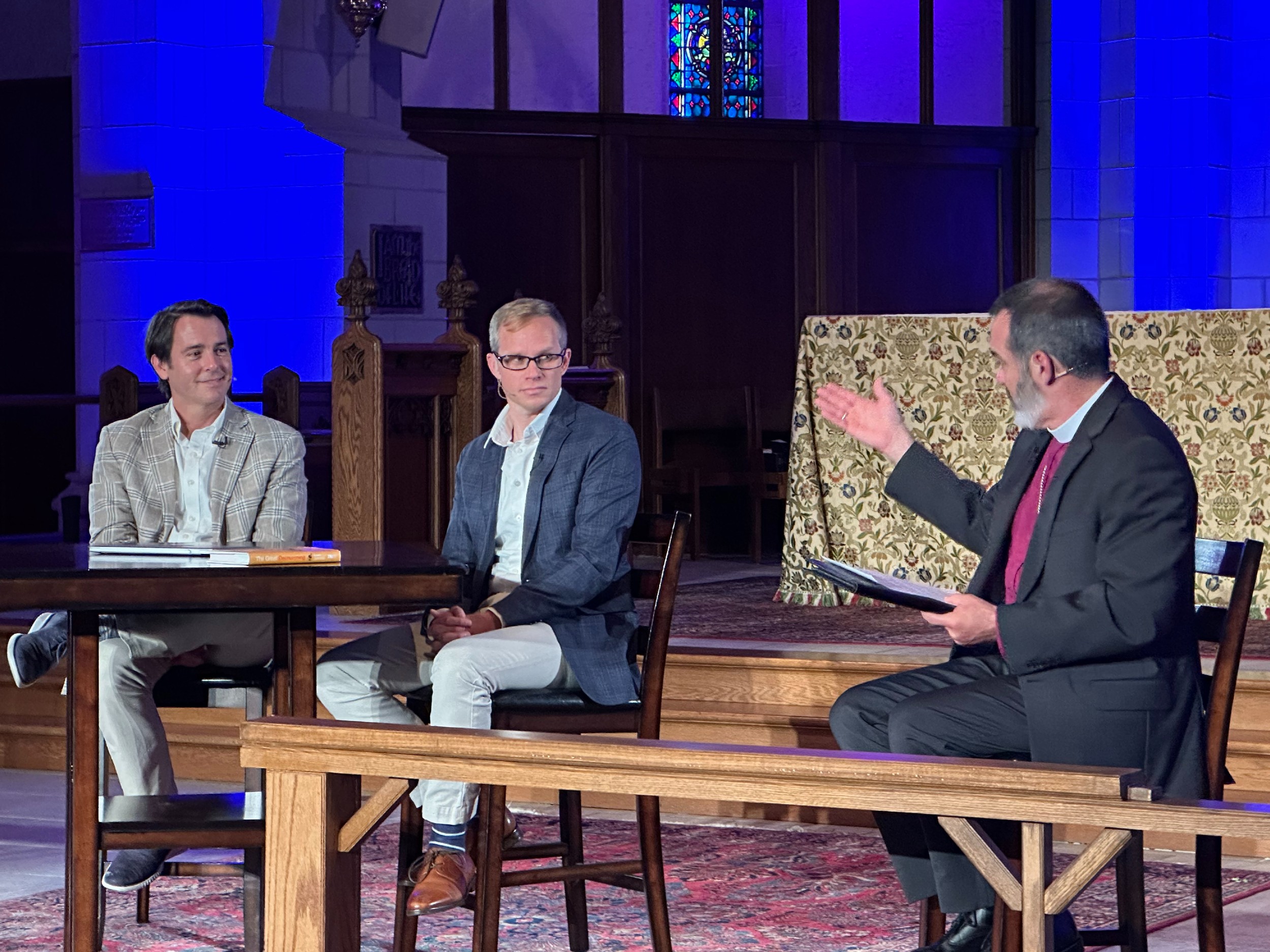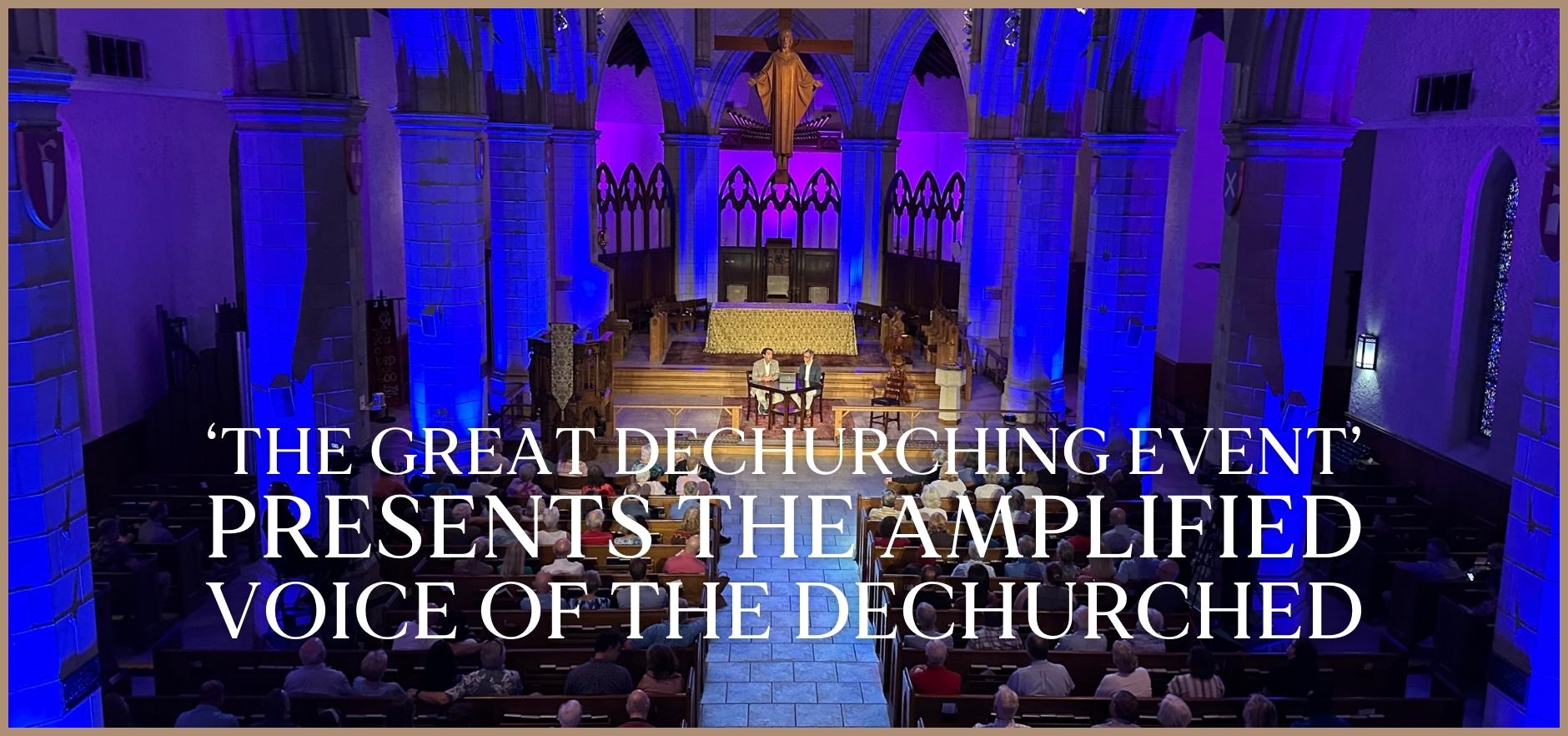On Saturday, Aug. 19, several hundred people from within and outside of the Diocese of Central Florida gathered at the Cathedral Church of St. Luke, Orlando, for “The Great Dechurching Event.” Per the Rt. Rev. Dr. Justin S. Holcomb, diocesan bishop and the evening’s host, the diocese designed this event to allow attendees to “listen to the amplified voice of the dechurched.” Presenters Jim Davis and Michael Graham, authors of The Great Dechurching, shared their research and insights, and C-SPAN recorded the event for “Book TV,” a television show dedicated to nonfiction books.
“In the United States, we are currently experiencing the largest and fastest shift in American religious history,” Holcomb said. “It’s bigger than the First and Second Great Awakenings and all other revivals in the United States combined, but it is not a great awakening – it’s a great dechurching.”
In the last three decades, over 40 million American adults have stopped attending church, and those in Central Florida are no exception. In fact, it was the rapid dechurching in their hometown of Orlando that led Davis and Graham to undertake the largest and most comprehensive study of dechurching ever. The results of their research became the focus of both their book and this special event.
Following an introductory synopsis by Davis, Graham presented an overview of the five major dechurched profiles delineated by their research: “cultural Christians,” “mainstream evangelicals,” “exvangelicals,” “BIPOC (Black, Indigenous, people of color) evangelicals” and “mainline Protestants/Catholics.” Within these groups, people who have dechurched fall into two categories. The first group, the “casually dechurched,” stopped attending church without actually intending to. The primary reason this group dechurched is relocation, although other changes in life circumstances such as marriage, divorce and COVID-19 also played a role. Davis and Graham call the second group the “dechurched casualties,” whose reason for leaving church is intentional, often due to a painful experience or trauma.

(L-R) Jim Davis, Michael Graham and Bishop Holcomb during Q&A at the Aug. 19, 2023, event at the Cathedral Church of St. Luke, Orlando.
“These aren’t just numbers,” Holcomb said. “These people are made in the image of God, people we love and care about: family, friends, neighbors and co-workers. We need to honor their voices, hear their hopes and concerns, and love them as God does, regardless of what they do on their Sunday mornings.”
While the numbers are startling, hope is not lost. “Over half of the dechurched are actively willing to return,” Davis said. Only 3% of participants in the study said they would never return to church.
During the event, Davis and Graham explained that some people need nothing more than a simple nudge to bring them back to church. Others need a dinner table, meaning more relational connectivity. Finally, some individuals, mainly dechurched casualties, will need years of patient and consistent presence in their lives.
To further train and resource clergy in understanding and reaching the dechurched, Holcomb has invited Davis and Graham to be keynote speakers at the 2023 Clergy Conferences, which are scheduled for Oct. 23-25 (priests) and Oct. 27-28 (deacons) at Canterbury Conference Center, Oviedo.
Having clergy and laity who understand the dechurched and have them as a missional focus is essential for our diocese, Holcomb believes. Metro Orlando (defined as the seven counties which include Orlando, Melbourne and Daytona) has 2 million people who are dechurched, making it the sixth most dechurched city in the nation. Put another way, 1 in 20 dechurched Americans live in Metro Orlando.
Davis sees the Diocese of Central Florida uniquely positioned to reach the dechurched. “There are many exvangelicals who would never return to an evangelical church but would be open to returning to a mainline denomination,” he said. He also believes our multigenerational churches will be a significant draw and blessing to those with doubts.
“To the priest, deacon or layperson feeling discouraged, remember it is only the Holy Spirit who is going to open hearts,” Davis said. With that foundation, he added, there is wisdom to be gleaned from the data, and he outlined several ways the church can engage wisely moving forward, including exercising relational wisdom, investing heavily in student ministries and leaning into a holistic gospel that is true, good and beautiful.
There is no doubt that we find ourselves in a unique point in church history, one that, Davis and Graham write, “could well be the American church’s most crucial moment and greatest opportunity.” Further, we find ourselves in a geographic region ripe with mission potential. If we do nothing, Davis and Graham warn that the children of the dechurched will become a generation of unchurched. Holcomb’s vision and prayer is that the clergy and laity of our diocese will embrace the challenge of this time.
View the entire “The Great Dechurching Event” here and purchase The Great Dechurching book here.

